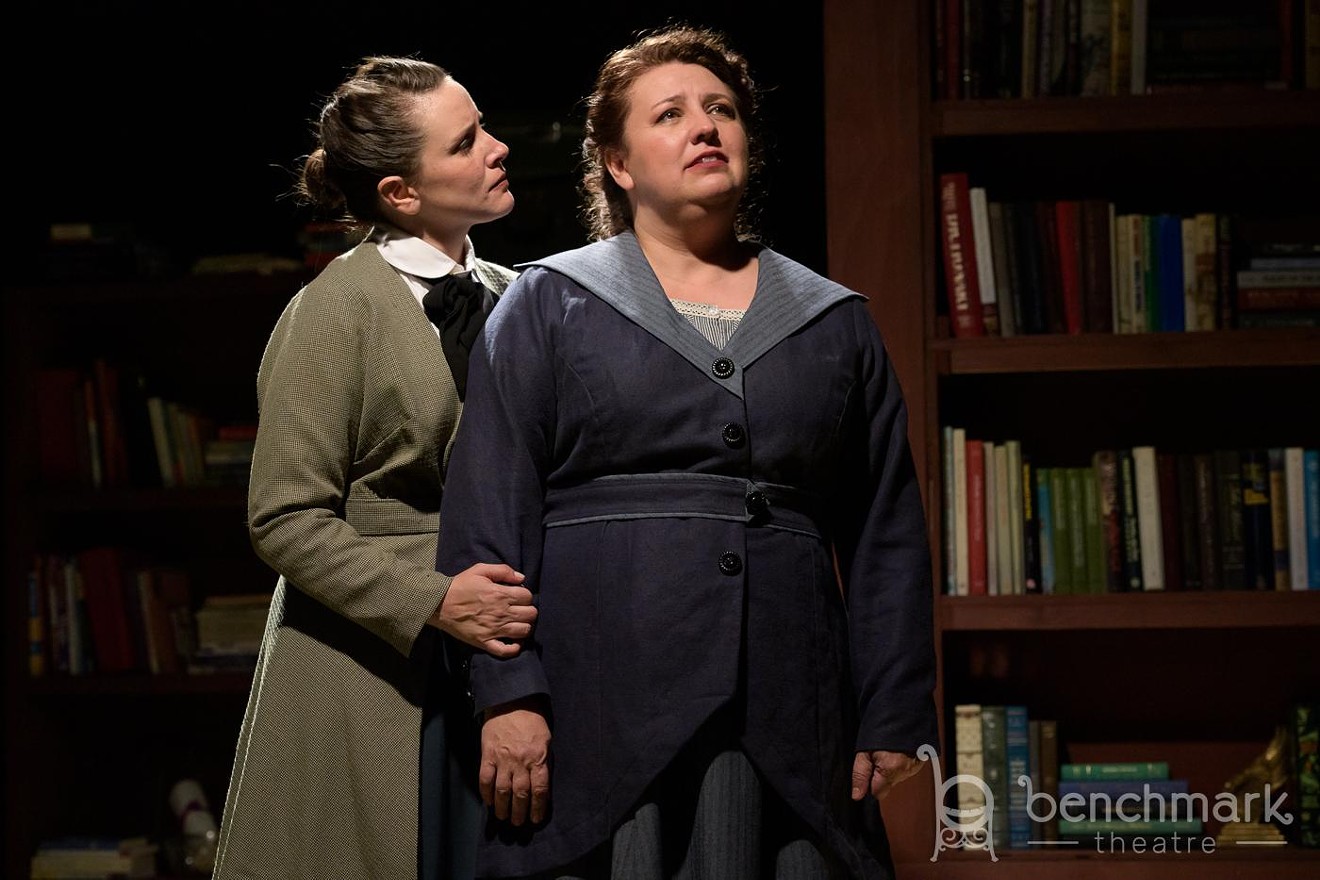In Bryna Turner’s Bull in a China Shop, currently showing at Benchmark Theatre, English professor Marks draws her class’s attention to the first sentence of Virginia Woolf’s Orlando: “He — for there could be no doubt of his sex, though the fashion of the time did something to disguise it — was in the act of slicing at the head of a Moor which swung from the rafters. It was the colour of an old football, and more or less the shape of one, save for the sunken cheeks and a strand or two of coarse dry hair, like the hair on a cocoanut.”
What Marks, who’s gay and in a long-term relationship with Woolley, president of the university, wants her students to analyze about this passage is that subclause beginning “for there could be no doubt of his sex.” From this she’ll move on to talk about gender and point to Woolf’s capacious understanding of the fluidity of sexual identity, a topic at the core of this play.
But there I am in the audience — it’s been years since I read Orlando, and at the time I liked it — stuck on the image of that Moor’s head, a real human head, though dehumanized by the description. The rest of the paragraph goes on to reference Africa and a “vast Pagan” decapitated by the protagonist’s father or grandfather, a forefather who, Woolf explains in that same jokey tone, “had struck many heads of many colours off many shoulders and brought them back to hang from the rafters.”
Orlando begins in Elizabethan times, when open prejudice against Moors was commonplace — though Shakespeare had something to say about that in Othello. And the culture may have been equally obtuse to both racism and colonialism near the beginning of the twentieth century, when Marks is speaking to her students. But as a dedicated feminist, shouldn’t she have noticed the appalling racism of this passage and thought that worthy of comment?
The university in question is Mount Holyoke, where Mary Woolley presided from 1900 to 1937 and rebellious writer Jeannette Marks taught, controversial among faculty and loved by students. Both are identified only by last name in the play. Together the two fought to expand the concept of women’s education from a place where students should learn to be good wives into a system that challenged their charges’ minds and freed their intellects.
Unfortunately, Bull in a China Shop isn’t quite sure what it wants to be. Turner, herself a graduate of Holyoke, wants to present Woolley as a fire-breather, but what she’s created is a comfortable upper-class educator in a pleasantly affectionate long-term relationship that’s periodically strained by the usual kind of lovers’ quarrel. Certainly Woolley’s and Marks’s open lesbianism made a brave and boundary-breaking statement given the times in which they lived, but that’s illustrated only by a few mild reproofs from Dean Welsh, a one-note, underdeveloped character who seems to have been created only to remind audiences that the couple’s politics and sexual proclivities were controversial. No angry parent or boardmember ever intrudes in the action.
There’s humor here, a gentle love story, a couple of curves in the road the women navigate. But these women’s historical importance rests on their contribution to women’s education, and the only student we actually see is a young black girl who’s desperately infatuated with Marks. Where’s the stunning pedagogy? Where are the classroom debates? Are any of the students’ lives changed? The young girl who slept with Marks stumbles on stage after being rejected to deliver a crazed monologue threatening both murder and suicide. Once she’s stumbled off, she’s never mentioned again, and we have no idea what happened to her.
Vast events occur in the outside world — the wild and passionate suffragist movement, for one thing — but the action is almost all off stage. And though the real Marks and Woolley were deeply involved in politics — Woolley worked with the ACLU and on the United States' entry into the League of Nations — there’s not much political discussion in the script, other than an argument about incrementalism versus radical action that screams for illustration. The second world war comes and goes without a perceptible ripple, though Woolley is sent on a puzzling — and I think historically inaccurate — peace mission with Herbert Hoover in the late 1930s.
Woolley and Marks were tough, passionate and brilliant, but here, despite terrific performances by Gabriella Cavallero as Woolley and Lauren Bahlman as Marks, their rebellion seems primarily to take the form of saying “fuck” a lot. As a result, a work intended to honor female heroism ends up illustrating only a lace-curtain, teacup feminism.
Bull in a China Shop, now through June 29, Benchmark Theatre, 1560 Teller Street, Lakewood.
[
{
"name": "Air - MediumRectangle - Inline Content - Mobile Display Size",
"component": "12017618",
"insertPoint": "2",
"requiredCountToDisplay": "2"
},{
"name": "Editor Picks",
"component": "17242653",
"insertPoint": "4",
"requiredCountToDisplay": "1"
},{
"name": "Inline Links",
"component": "18838239",
"insertPoint": "8th",
"startingPoint": 8,
"requiredCountToDisplay": "7",
"maxInsertions": 25
},{
"name": "Air - MediumRectangle - Combo - Inline Content",
"component": "17261320",
"insertPoint": "8th",
"startingPoint": 8,
"requiredCountToDisplay": "7",
"maxInsertions": 25
},{
"name": "Inline Links",
"component": "18838239",
"insertPoint": "8th",
"startingPoint": 12,
"requiredCountToDisplay": "11",
"maxInsertions": 25
},{
"name": "Air - Leaderboard Tower - Combo - Inline Content",
"component": "17261321",
"insertPoint": "8th",
"startingPoint": 12,
"requiredCountToDisplay": "11",
"maxInsertions": 25
}
]












